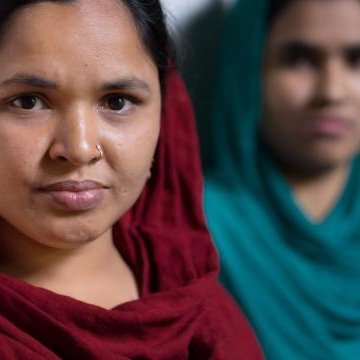High street brands linked to ‘union busting’ during COVID-19 as thousands of garment workers sacked after asserting rights

Brami Jegan
- Nearly 5,000 workers sacked by factories in Asia that supply major fashion brands in nine cases of alleged ‘union busting’
- In 7/9 cases suppliers blamed COVID-19’s impact for the dismissals, but workers say union members are being targeted
- Brands including H&M, Inditex (Zara) and Levi Strauss & Co. linked to unresolved cases - despite policy commitments to respect trade union rights. Three brands – Michael Kors, Kate Spade and Tory Burch have not responded to allegations.
- Cases include an H&M supplier sacking all 1,200 workers at a unionised factory in India, and a MANGO and Inditex supplier in Myanmar sacking 500 union members just hours after union leaders requested better COVID-19 protections
London, UK – Millions of garment workers have lost their jobs as fashion brands have canceled orders and delayed payments during the pandemic. Yet workers who belong to a union and have organised for safer working conditions amid fears of infection have been targeted for dismissal.
A new report by Business & Human Rights Resource Centre (BHRRC) looks at nine cases in garment factories in India, Bangladesh, Cambodia and Myanmar supplying nine global fashion brands: H&M, Primark, Zara (Inditex), Levi Strauss & Co., MANGO, BESTSELLER, Michael Kors, Tory Burch and Kate Spade (Tapestry).
Cases include:
- A supplier in India making clothes for H&M sacked all 1,200 garment workers at a unionised factory in June, citing lack of orders amid COVID-19. The supplier’s 20 other units remain open. Workers and unions claim the closed factory was the supplier’s only one with unions and was targeted for this reason.
- Three factories owned by the Windy Group in Bangladesh, which supplies Inditex and H&M, sacked 3,000 workers. The workers say the dismissals are linked to their union activism, and protests continue.
- 107 garment workers in Myanmar making clothes for Inditex, Bestseller and Primark, were sacked three days after they registered a new union.
- Soy Sros was making handbags for Michael Kors, Tory Burch and Kate Spade in Cambodia when she was arrested and jailed for 55 days over a Facebook post criticising the factory’s plans to sack union members, including a pregnant woman. All three brands failed to respond to the allegations. Sros faces ongoing criminal charges.
Cases profiled in this report are the tip of the iceberg. The ITUC has reported a global crackdown on trade unions, with at least 53 countries restricting human and labour rights during the COVID-19 pandemic and local unions report many other cases.
Thulsi Narayanasamy, Senior Labour Rights Lead at BHRRC, said:
“COVID-19 has already been used as an excuse by fashion brands to act against the interests of the most vulnerable workers by cancelling orders and leaving suppliers in the lurch. Now workers face a brutal crackdown when exercising their most fundamental rights and brands aren’t stepping up enough to ensure workers in their supply chains are protected.”
“Workers in global supply chains are more vulnerable than ever as COVID-19 exacerbates existing inequalities and power dynamics. Threatening the right to organise collectively and be part of a trade union at such a critical time is akin to cutting garment workers off at the knees: It attacks a key source of collective power and effectively stops them from being able to ensure they are paid wages, are safe at work and free from harassment. These threats send a powerful message to other workers on the real cost of exercising their fundamental freedoms”
“Fashion brands are aware that this is happening, and they must step up and take responsibility for workers by ensuring that these cases are resolved swiftly and fairly, and by changing their own practices that enable union suppression in supply chains. Brands can do more than make policy commitments to rights and now is the time to ensure workers and unions are directly and meaningfully engaged and their voices taken seriously.”
//ENDS
Media contacts:
Adam Barnett, Communications Officer, Business & Human Rights Resource Centre, [email protected]
Thulsi Narayanasamy, Senior Labour Rights Lead, Business & Human Rights Resource Centre, [email protected]
Unions representing the workers profiled in this report are available for interview. Their contact details can be provided upon request.
Notes to editor:
*In Myanmar and Cambodia at least 60,000 and 150,000 garment workers respectively have lost their jobs as a result of the pandemic, while the Bangladesh Centre for Worker Solidarity estimates that up to 1.8 million garment workers in the country will lose their jobs in the coming months.
For more about how brands are responding to the pandemic view the BHRRC COVID-19 Apparel Tracker here.